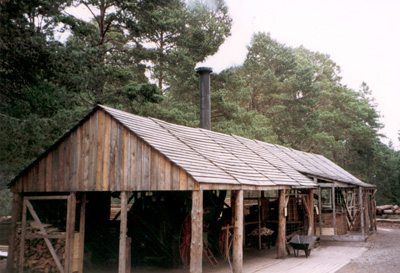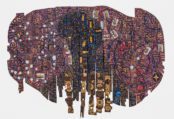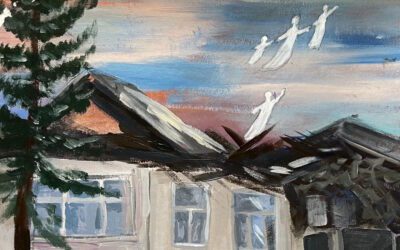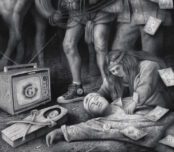On the 16th of June there was a bomb blast in Abuja, at the police headquarters.
At the time of writing this they had not released the figures for the number of dead yet, except to confirm that the two men driving the car packed with explosives were killed, as was the parking attendant who was showing them to the visitor’s car park.
They gained entrance to the compound by trailing in on the end of a convoy carrying the Inspector General, Hafiz Ringim. It’s unknown whether he was the target of the attack, but when it was realised that the men weren’t a part of the convoy, the attendant in the car park asked them to move and was killed in the ensuing blast. Although the latest story is that he got into the car to show the man where to go, and that there was in fact only one bomber. It’s hard to tell.
Of course, the explanation could be something completely different, and if there’s one thing that Nigeria is not short of, it’s conspiracy theories.
 I spoke to someone earlier whose office building backs on to the site, and he said that the scale of the devastation was massive, with one body being thrown a hundred yards into a nearby street and a scattering of body parts clearly visible. Another friend told me that the Red Cross were evacuating bodies but concentrating on the wounded, and so it would be a while before the casualty count was known.
I spoke to someone earlier whose office building backs on to the site, and he said that the scale of the devastation was massive, with one body being thrown a hundred yards into a nearby street and a scattering of body parts clearly visible. Another friend told me that the Red Cross were evacuating bodies but concentrating on the wounded, and so it would be a while before the casualty count was known.
Whatever the final figure, the current estimate of 2-6 dead looks on the low side. But that’s often the case here – in all the violence that surrounded the recent elections, especially in the north, the troubles themselves were reported, but the number of dead was always kept either quiet, or seemed not to tally at all with witness accounts. I don’t know why this is. The official explanation at the time was so that there would be no public panic, but I’m not sure that’s convincing. I suspect it’s that the security forces fear criticism both political and public, and that there’s some notion that a high body count will somehow equal good publicity for the attackers. Of course, the explanation could be something completely different, and if there’s one thing that Nigeria is not short of, it’s conspiracy theories.
If they can’t even protect their own HQ, what hope have they got of protecting the rest of us?
A report on a news website here finishes its report with the lines, “Members of the public are assured that the criminal elements behind this dastardly attack will be fished out as the government, the Police and other security agencies will not succumb to the demand of any criminal group or individual.” The vocabulary, completely different from the rest of the article, tells you that is a direct quote from a police announcement, and it doesn’t even really make sense. It’s equally clear that no one’s going to be convinced.
The comments thread alone tells you that people don’t trust the police, and the general mood on there is one of equal condemnation of the security forces and the bombers. If they can’t even protect their own HQ, what hope have they got of protecting the rest of us? seems to be the general message, and this distrust is not surprising, for a number of reasons.
The police here are primarily known for lining their own pockets rather than enforcing the law. I attended a lecture recently given by a retired General, and someone who sat on the major security councils until last year. He said that the thing he hated the most was providing his troops to support the police force. They would start to act like police, he said, “wanting N50 for everything”, and I can tell you it’s a lot more than 50 naira if you’re an oyibo. But when he tried to withdraw his men from this role, he was unable to because he was told that without the support of the army the police force would be so ineffective as to be pretty much meaningless.
So the lack of faith should not really come as a shock.
There has also not been anyone taking credit for the attack so far. It would, obviously seem to have some relation to the ongoing tension between north and south, which has only been exacerbated by the recent election results. The south is predominantly Christian, and is also far wealthier than the Muslim dominated north that doesn’t have any oil reserves. The victorious Presidential candidate, Goodluck Jonathan, is a Christian southerner, and he defeated a Muslim northerner, Buhari. Whilst the election was praised as being the freest and fairest in Nigeria since the end of military rule in 1999, that comes with the serious caveat that previous elections were so corrupt as to actually be laughable.
Whilst the election was praised as being the freest and fairest in Nigeria since the end of military rule in 1999, that comes with the serious caveat that previous elections were so corrupt as to actually be laughable.
CPC, Buhari’s party, are contesting the results, as they say that the presidential election was rife with malpractise. Buhari has also refused an invitation to join Jonathan’s cabinet because he says that he cannot in good conscience be a part of a government that he believes was not honestly elected.
All of this could be the root cause, and another bomb went off near Kano today, killing 3 children. Trouble has been pretty much constant throughout this year in the north, and another friend of mine said today that they thought that the lack of trouble in Abuja was too good to last. Obviously, they were right.
Another element to throw into this mix is Boko Haram, a terrorist group whose name effectively means “Western/secular education is forbidden”. Haram is the opposite of halal, and the group is dedicated to combatting the spread of Western liberal values and education, and they have been responsible for a huge amount of violence over the last 10 years, including the killing of a gubernational candidate in January this year.
The manifesto of this group throw into sharp relief another factor in the divide between north and south. I work at a university here, and I was told a few weeks ago that there is a state in the south, with a population of 5 million, that produces more secondary school graduates per year than the entire north, which has a population of at least ten times that. I’ve been unable to verify that figure, but it’s easily believable. UNESCO figures, and figures from surveys carried out to feed into Nigeria’s new “education road map” both show that whilst the education system in the country is in chaos, the situation is far worse in the north. There, the level of illiteracy is one of the highest in the world, and the disparity in gender clearly shows that girls are far less likely to even complete primary school than the boys. As many of these figures were gleaned from house to house surveys, it’s also likely that the real situation is in fact far worse than the published account.
Another element to throw into this mix is Boko Haram, a terrorist group whose name effectively means “Western/secular education is forbidden”.
Some of the stereotypes you would expect to feed into this are correct. Children are taken out of school so that they can earn money for their family, or because their family cannot afford the fees, or because there is seen as being no value in them continuing because it will not enable them to get a better job anyway. Many muslim families also removed their daughters from school because they do not believe that women should be educated, or because they want them to get married. Many girls do not even finish primary school. This is not the case everywhere, but it is widespread.
And when you start to examine the dire state of the entire Nigerian education system, this predicament looks even worse. Those that do make it through secondary school face a situation where there are around 300,000 university places for 1.3 million qualified students per annum. Cumulatively, it is reckoned that there are 13 million youths that wanted places at university since independence that have been unable to get them. Jonathan has just signed off 9 new federal universities, but this is a drop in the ocean, and there’s extreme scepticism as to how many of the billions of naira earmarked for this project will ever actually make it to the ground.
The JAMB test, the Nigerian equivalent of SATs and a requirement for university entry, has been specifically designed to reduce the number of students that pass as a means to address the chronic disparity between supply and demand. I didn’t fully believe this until I looked at example papers myself recently (I manage a department that, amongst other things, is coaching students for the exam). The English section is riddled with mistakes, the comprehension texts are so arcane and the questions so ambiguous as to be impossible to answer, even for me, and the vocabulary exercises ask students the meaning of such everyday words as “plebeian” and “misanthropic”. The economics section, by the National Universities Commission’s (NUC) own guidelines, contains material that students should not have been taught until their second year at undergraduate level. It’s a mess.
The NUC is itself an utterly ludicrous and corrupt institution. It routinely demands bribes, and its stipulations for new universities insist that every campus must have space for a zoo, and that you must have 100ha of land before you can open. It also stipulates the exact square metrage required for the office of every rank of academic staff, but is a lot quieter on the standards of teaching. I’ve been told that lecturers at state universities deny their postgraduate students access to new books and research because they don’t want to be overtaken by them, and it’s certainly true that grades are sold for money and sexual favours on a routine basis. Some of our students who are due to take JAMB on Saturday have practically admitted to their tutors that they are going to Kano to take the test so that they can buy their marks. They don’t care – they think it’s just the most sensible route.
The English section is riddled with mistakes, the comprehension texts are so arcane and the questions so ambiguous as to be impossible to answer, even for me
Tony Blair visited this week, and his advice to Goodluck Jonathan was that it was easy to know what to do, but the important thing was to work out how to do it. Understandably, these remarks provoked a certain amount of outrage – why are you coming here and telling us what to do, etc. – but he’s right. Everyone here, from the stupidest illiterate taxi driver to the smartest, foreign educated entrepreneur could tell you that you need to tackle corruption, sort out the power supply, build a functioning infrastructure and ensure that public institutions are actually somewhere near fit for purpose – but how to make any of this happen is not that easy a question to answer.
When having discussions like this, it’s customary to say something along the lines of “this is a great country, but for…” or “the people deserve better”. The latter I agree with, but the former I’m increasingly not so sure about. What do mean when we talk about a country? Are we talking about the idea, the “magnificent myth”, or “noble lie” as described by Plato, do we mean the actual structures and systems that make up the state, or are we talking about the people?
When I asked these questions of my students, the level of cynicism was remarkable. Many of them believed that corruption would never get any better – “nothing will ever change” – and some of them even argued that it was actually helpful, that it was the only way to get things done. There was a lot of passionate loyalty to the nation, but none of them could tell me the values that Nigeria stood for. Everything they described was bad, although there was perhaps a glimmer of hope in their belief in the people and the culture.
But their cynicism and their pessimism is revealing – because Nigeria is not a great country at the moment. It’s fucked. Nothing works, the state is a joke, and people die every day for no reason whilst others grow so rich that they are on a par with the wealthiest in the world. I read a story the other day about the police arresting a goat for car theft because a local vigilante group claimed that it was a witch that had changed its shape to avoid punishment. A recent crime report detailed a similar transformation (of a burglar into a cat), and also had the story of a man being imprisoned for procuring a 5 year old girl’s genitals for a rich man that wanted to conduct some black magic rite. Where does talking about tolerating cultural difference end and talking about the importance of education begin? I’m being deliberately provocative but the question is an important one. When you can see a police convoy of multiple cars carrying a goat to interrogation (which friends of mine did last weekend) it is clearly obvious that even amongst the police force the level of education is routinely appalling.
there’s too much inertia fighting against any real progress, and this is a story that concerns us as well as Nigeria.
Don’t get me wrong – I am not suggesting that Nigeria is inherently bad, that there is no hope, or that the people bring this upon themselves. All of that is patently untrue. In my experience the people here are no better and no worse than the people of any other nation. I have met kind, welcoming and friendly people on all levels of society, and people who are the exact opposite, again not determined by tribe, religion, creed or wealth. The country has huge potential, and advantages that many African countries don’t have – namely a huge amount of oil and natural resources and a massive population. It is fertile, there is growing desire for political change, and it’s a hugely enjoyable place to live.
But there’s too much inertia fighting against any real progress, and this is a story that concerns us as well as Nigeria. The other night at an official dinner, as people told stories of corruption, malpractice and absurd bureaucracy and everyone laughed, it was pointed out that we should be getting angry instead of amused. The pause lasted for less than 5 seconds before people carried on. Because the people present were the wealthy elite and life here works for them. And without wishing to sound like a cod anti-capitalist, the world system that keeps wealthy elites like this in place depends on our participation, and if it is to change then it’s not enough to read what little coverage of bombs like today’s actually reaches UK, or “Western” media outlets, and think “how sad”.
What am I asking of you? What am I asking of myself? I’m not sure, if I’m honest. But that’s not enough to stop me asking something. I don’t think that you can put down your coffee and stride out to take action. There’s a massive belief in divine miracles and self-help in Nigeria and the two are intextricably linked for me – they offer a promise of magical intervention, or of making one change and pulling the rabbit of the perfect life and the perfect world out of the hat. It isn’t going to happen, and I don’t believe in miracles any more than I believe in god. All I can think of is that the first step is to be aware and to not just blindly roll along and think only of politics in terms of what-about-me? It’s become unfashionable to be political, and there’s a good reason for some of our scepticism, but that doesn’t mean that we should abandon the attempt to make the world a better place.
There’s a massive belief in divine miracles and self-help in Nigeria and the two are intextricably linked for me – they offer a promise of magical intervention
It’s a weak and unconvincing battle cry. But it’s all I have to offer. To nick a line, the very fact that you’re reading this means you are silver-spoon born privileged, but I don’t expect you to feel guilty about that. You’re no better and no worse than anyone, any where, it’s just an accident of birth. But take a look at yourself and what you think about things, about how much you know about the world and how you react to questions of politics and when you stop to think about these things and when you just carry on in your bubble. I’m not excluding myself here, and I don’t think the answer is going to suddenly fall out of the sky. But like it or not, you and I have far more privileges than most of the people on this Earth and we don’t do fuck all with them.
I don’t want to make everyone conform to some Western liberal standard by any stretch of the imagination, but until we do something to increase the spread of education to places like the north of Nigeria the situation will not change. And If this little rant makes you do nothing else, appreciate what you’ve got, and be prepared to fight for something better. Because people are dying out there.
Images by freeimages.co.uk




















